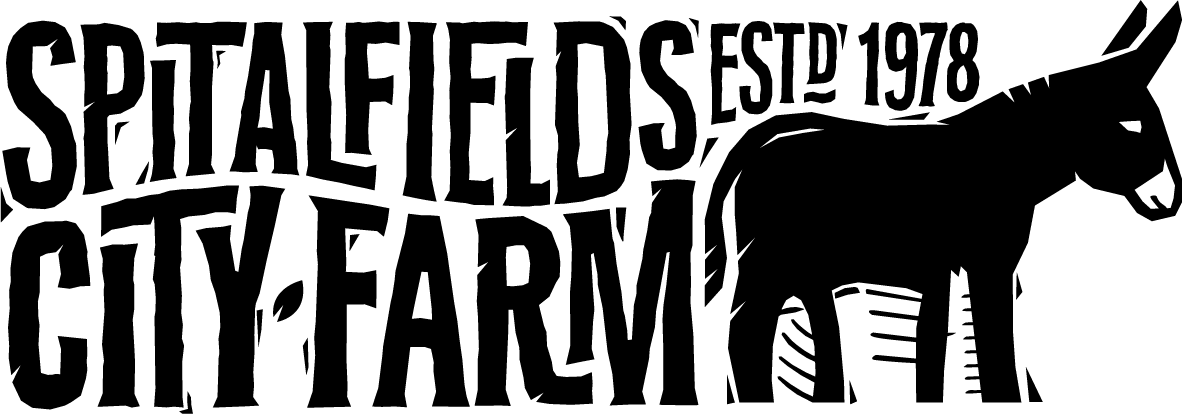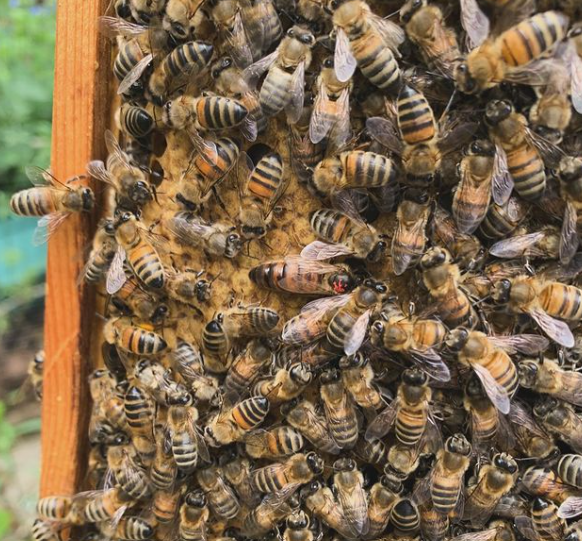IN FOCUS! Beekeeper Interview on Farm Bees & Honey Production
Summer 2024 Edition - written by Sam Dodd in conversation with Salvatore Scotti
For our Summer In-Focus piece, our editor Sam Dodd interviewed Salvatore Scotti, the farms much-loved local beekeeper, for some interesting facts on honeybees and our colony.
~
The farms current colony is the product of a swarm rescued from Mile End Park in April, after I received a call from a member of the public. It was not a primary swarm, but a cast swarm, meaning the queen was a virgin queen, which in turn means when the colony is rehomed she has to go out from the hive and meet ‘the boys’, coming back and starting the cycle – laying eggs, growing the colony. It has been a strong colony and is a successful project – they have produced quite a bit of honey and the hive has four supers on now (which are the various wooden box layers we see in the photo), from starting with just one, which is fantastic progress. Supers are where the honey is stored, and the more you have the more successful the colony is.
Image credit: Salvatore Scotti. Can you spot our queen bee?
I come on site to check our girls regularly. When I visit, I’m looking for the following: any signs of disease, if they seem happy or distressed (marked by flight paths and buzz intensity), and I ensure the supers and hive structure is working and that they have enough room. One problem bees can be afflicted by is the varroa mite, a parasitic mite that infests the hive aggressively. Bees are unable to fight it on their own, so human intervention is needed. Hives are at risk directly after honey production and moving into the autumn, so at the farm we will start preventative treatment of the hive soon after this summer’s honey harvest – honey destined for human consumption needs to be removed before the treatment is applied. This treatment also has to change year to year, as the varroa has been known to develop resistance.
The Farm will be selling our girls honey once we have jarred and labelled it, which is currently looking to be in September. Then, nearing the end of autumn, we begin the process of preparing the colony for winter. People often think that bees produce honey for humans, but they do not. It is their food, not ours – humans are merely fortunate enough to be able to harvest excess for our consumption. Beekeepers always keep a generous amount in the hive for the bees – they need this reserve of honey to keep them alive over the cold months when they are active but far slower, and do not exit the hive, so their hard work in the summer is really to ensure their survival in the winter. We protect the hive from cold and rain over the winter by adding insulation pads around and on top of the hive, ensuring that we keep as much cold out as possible. Interesting fact: ‘winter bees’, so the ones born in or just after September, are the ones that live the longest. Bees born at other points of the year are not as hardy.
Another predatory insect I really want to raise awareness around is the Asian Hornet. It is an invasive non-native species around four times the size of a honeybee, which destroys colonies and kills honeybees incredibly fast once it takes hold. They were first found in the UK in 2016 and have been presenting a risk ever since, almost decimating the entire honey bee population across the whole island of Jersey just a few years ago. It is essential that the general public is able to identify and report sightings of the Asian Hornet, and the National Beekeeping Association has ID sheets and a reporting portal that anyone can use. Honeybees are one of our main pollinators – without them, our national food production capacity is enormously at risk.
It is said that people with allergies benefit from eating local honey, as there are traces of the local pollens that are causing their allergies in the honey, so in a way it behaves like a vaccine. There is only anecdotal evidence of this, as there have not yet been enough scientific studies carried out – but the many people who tell us this works for them, speaks for itself.
~
As well as taking care of our Farm girls and producing our honey, Salvatore also has his own colonies on the edge of the City, just minutes from the farm, producing honey from his home. Click here for his Instagram, Wilkes Street Honey!

